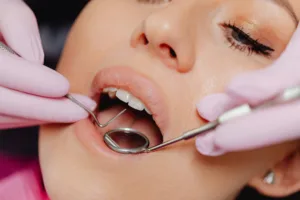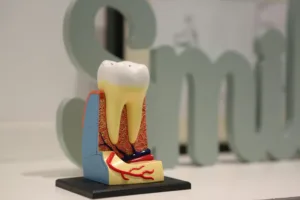Dental Probing and Bleeding Gums: Causes and the Role of Flossing
Dentists often use a sharp tool known as a periodontal probe during routine checkups to assess the health of your gums. This procedure, while it may seem uncomfortable and sometimes causes bleeding gums, is crucial for diagnosing gum diseases like gingivitis and periodontitis. Many patients wonder why dental probing leads to bleeding gums and why it is often attributed to inadequate flossing. To understand this, we must explore the anatomy of the gums, the role of plaque and tartar, and understand why regular flossing plays a crucial role in maintaining oral health.

The Anatomy of the Gums and Teeth
Healthy gums, or gingiva, are firm, pale pink, and fit snugly around the teeth. The space where the gum and tooth meet is known as the gum pocket. Dental probing is essential to measure the depth of this gum pocket, as its size indicates gum health. If the pocket is shallow (1-3 millimeters), the gums are healthy, but deeper pockets could signal gum disease and indicate that you need medical care.

The Role of Plaque and Tartar
Plaque and tartar are primary contributors to gum disease. Plaque is a sticky film of bacteria that forms on the teeth, while tartar is hardened plaque that accumulates along the gumline. Without proper flossing, these deposits irritate the gums, causing gingivitis, which can progress to periodontitis if untreated.
Why Gums Bleed During Dental Probing
When dentists use a periodontal probe, the appearance of bleeding gums often points to gum disease caused by plaque and tartar buildup. Bleeding gums occur because of inflammation triggered by toxins from bacteria in plaque. Early signs of gingivitis, such as bleeding gums, red gums, and swelling, worsen without intervention, highlighting the need for flossing and professional dental cleanings.
The Importance of Flossing
Flossing is essential for removing plaque and tartar from hard-to-reach areas between the teeth and along the gumline which cannot be achieved by simply brushing your teeth. Incorporating flossing into your daily oral hygiene routine reduces the risk of gum disease and helps prevent bleeding gums. Here are the key benefits of flossing:
- Prevention of Plaque and Tartar: Regular flossing prevents plaque and tartar from forming in interdental spaces.
- Improved Gum Health: Flossing reduces inflammation and prevents the progression of gingivitis and periodontitis.
- Reduced Bleeding Gums: Consistent flossing strengthens gums and reduces sensitivity.
The Consequences of Not Flossing
Neglecting to floss can have serious consequences for your oral health:
- Plaque and Tartar Build-Up: Without flossing, plaque and tartar accumulate, exacerbating gum inflammation.
- Bleeding Gums: Inflammation from untreated plaque and tartar leads to bleeding gums.
- Gingivitis and Periodontitis: Unchecked inflammation advances from gingivitis to periodontitis, causing severe damage to the gums and teeth.
Dental Probing and Gum Disease Prevention
Regular dental checkups, where periodontal probes are used to assess the depth of your gum pocket, play a critical role in identifying and managing gum disease at an early stage. Clinics like Pune Dental Studio Baner Pune, led by Dr. Sunayana, emphasize the importance of preventive care. By addressing bleeding gums and removing plaque and tartar, professional cleanings help maintain healthy gums.
Why Choose Pune Dental Studio Baner Pune?
At Pune Dental Studio Baner Pune, we make sure that our patients receive personalized care focused on preventing and managing gum disease. The use of tools like periodontal probes ensures accurate diagnosis, while expert guidance on flossing and oral hygiene minimizes issues like bleeding gums. Dr. Sunayana’s has years of expertise under her belt which ensures that your gums remain healthy and free from conditions like gingivitis and periodontitis.

